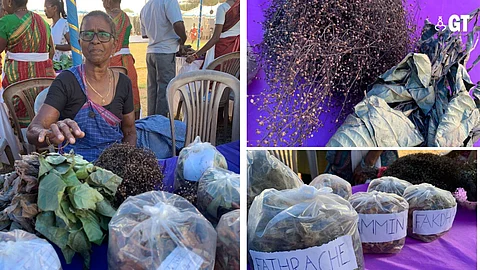

Dressed in a faded blue kunbi saree, Josefa Avelina Fernandes stood at a counter at the Tribal Festival in Quepem selling some very unique items – special herbal leaves, which cure almost any ailment. From regular cough and cold to kidney stones and even diabetes, her herbs and her hands ensure your good health.
“In the past people didn’t have the money to go to doctors, or you could say there were hardly any around. So people would go to the jungles to source leaves and roots, make concoctions by boiling these and drink,” says Josefa, who started selling these medical leaves herbs in her village in Quepem taluka.
At the same festival was Maria Fernandes, whose deep wrinkles spoke of years of hard work, selling similar produce and herbal medicines.
“I have been doing this for many years. Now I’m in my 80s and people still call me to get their medicines, mostly for kidney stone ailments,” says Maria, whose stall had a variety of packets for different ailments.
I have been doing this for many years. Now I’m in my 80s and people still call me to get their medicines, mostly for kidney stone ailments.
Maria Fernandes, makes local medicines
NO YOUNGSTERS WANT TO LEARN
Josefa, who is in her early 70s, says that her parents were known as doctors in the village and this art was passed down from them to her. “This is a very time-consuming skill. We have to walk for hours in the forest and search for the leaves we need. Sometimes it takes me a whole day,” says Josefa, as she attends to her customers.
Jacqueline, who attended the festival, walked to the stall to purchase some packets of herbal leaves from Josefa.
As trees and hills are slowly being cut for development purposes, people like Maria and Josefa find it even more difficult to track these plants and leaves.
“My husband has a few kidney stones and was asked to go in for a surgery to remove them. Before we took that step, we decided to try the local medicines. Luckily he is improving,” says Jacqueline.
When asked if her children or grandchildren want to learn this art, Josefa smilingly says, “My kids don’t want to learn. They say the pharmacies have medicines which are way cheaper than these. So let’s see how long we can keep this tradition of making gharguti (local) medicine work. I try to teach the young kids, but the problem is that they don’t want to take that effort to walk and search these medicinal leaves.”
DISAPPEARING HILLS AND TREES A STUMBLING POINT
As trees and hills are slowly being cut for development purposes, people like Maria and Josefa find it even more difficult to track these plants and leaves. While a customer was buying a few herbs from Josefa, she said to them, “Bai, keep these leaves safely in a dry container, they are extremely difficult to find and it took me a long time to find them.”
It was a bundle of dried leaves and the selling price was just Rs 40. But it is in the manner in which the concoction is to be made, which Josefa explains in detail, that makes them work. In a world, where allopathy has taken over, there are people who still believe that gharguti medicines will cure them. Maria says that she still gets people who come to her after trying various medicines and feel they’ve been cured by the gharguti vokod (local medicine).
A PROFESSION WHICH NEEDS MORE MARKETING
A question many would have is whether this works and this is best answered by experience. Ryspha Monteiro, who was at the tribal festival, said she learnt from her school in Curtorim that her classmates from Quepem and neighbouring areas were always in perfect health.
“I wondered why .They knew what herbs to take and they were never sick like the others.”
Effectively promoting this traditional wisdom will not only create new income opportunities for locals but also preserve Goa’s rich heritage and at the same time ensure a healthier future for Goans.